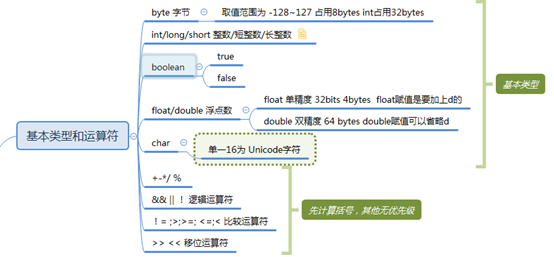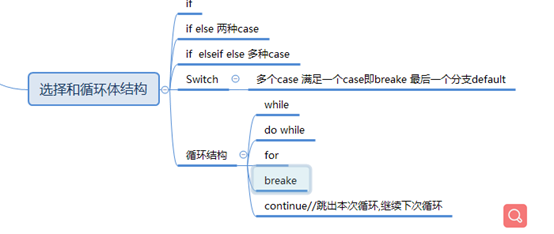{Java初级系列二}---------Java类基础知识
本人为自学Java系列,内容来自于中国大学mooc华东师范大学陈育良教授《Java核心技术》,在此感谢老师!
一:Java类结构和main函数
-
Java文件只能有一个public class
-
Public class的名字还必须和文件名一致
-
文件可以有多个class,但是只能有一个是public。不提倡一个文件里面放着多个类(内部类除外)-------这个先记住,我们后面再贴代码理解
-
public class IntegerTest {
-
// PSVM 为函数入口 main函数是java程序入口
-
public static void main(String[] args) {
-
int a = 5; // 成员变量
-
int b = 6;
-
int c = a+b;
-
/* 同样可以写为
-
* int a, b, c;
-
* a=5;b=6;
-
* c=a+b;
-
*
-
*/
-
-
System.out.println(c);
-
}
-
}
类是由两种构成
-
成员变量/属性
-
成员方法/函数
-
Main函数:
一个class只能有一个main函数,没有main函数的class只能被动被调用
-
public class ArgumentTest {
-
-
public static void main(String[] args) {
-
// TODO Auto-generated method stub
-
for (int i=0; i<args.length;i++)
-
{
-
System.out.println(args[i]);
-
}
-
}
-
}
上图程序就是一个需要手工输入参数的java程序
二:基本类型和运算符

共计八种基本类型和若干运算符,这些也不需要记住,到实际应用场景实践即可
三:选择结构和循环结构

任何选择和循环结构我认为都可以理解为一个自定义函数,每个都是一个方法名,对应后面都是有方法体。
选择结构:
-
public class Test123 {
-
-
public static void main(String[] args) {
-
// TODO Auto-generated method stub
-
int a = 10;
-
if (a>10) {
-
System.out.println("aaaaaa");
-
}
-
if(a>11) {
-
System.out.println("bbbbbb");
-
}
-
else
-
{System.out.println("cccc");
-
}
-
if (a>=5) {
-
System.out.println("dddd");
-
}
-
else if (a<=5){
-
System.out.println("fffffff");
-
}
-
else
-
{System.out.println("eeeee");}
-
}
-
}
输出结果:

Switch选择结构:
Case就可以满足多个分支:
每个case后面都要加上break来中断,最后一个分支为break。最后一个分支为default
-
public class test1234 {
-
public static void main(String[] args) {
-
int a =1;
-
int b =2;
-
switch(a+b) {
-
case 1 : System.out.println("aaaaaa");
-
break;
-
case 2 : System.out.println("bbbbb");
-
break;
-
case 3 : System.out.println("cccccc");
-
break;
-
default:System.out.println("dddddd");
-
}
-
String a3 = "abc";
-
switch (a3) {
-
case "abc":System.out.println("eeeee");
-
case "def":System.out.println("fffff");
-
case "ghj":System.out.println("ggggg"); }
-
}
-
}
循环结构:
While和do while两种循环体区别在于: while是先判断后循环,判断条件满足才会执行循环体内语句;而do-while是先执行循环中的语句,然后再判断表达式是否满足,如果为假,就终止循环
-
public class TEst12345 {
-
-
public static void main(String[] args) {
-
// TODO Auto-generated method stub
-
System.out.println("============While Test============");
-
int x = 10;
-
while(x<20) {System.out.print("value of x is: "+x) ;
-
x++;
-
System.out.println("\n");
-
}
-
System.out.println("====Do while Test=========");
-
int x1 =10;
-
do {
-
x1++;
-
// continue 结束当前循环,继续下次循环。当前余下的循环余下的代码不做
-
if(x1%2==0) {continue;}
-
System.out.println("value of x is: "+x1);
-
}while(x1<20);
-
}
-
}
输出结果如下:
-
============While Test============
-
value of x is: 10
-
value of x is: 11
-
value of x is: 12
-
value of x is: 13
-
value of x is: 14
-
value of x is: 15
-
value of x is: 16
-
value of x is: 17
-
value of x is: 18
-
value of x is: 19
-
====Do while Test=========
-
value of x is: 11
-
value of x is: 13
-
value of x is: 15
-
value of x is: 17
-
value of x is: 19
For循环
-
public class Fortest {
-
public static void main(String[] args) {
-
// TODO Auto-generated method stub
-
for(int i=0;i<4;i++) {
-
for(int j=0;j<5;j++) {
-
if(j<=i) {
-
System.out.print("*");}
-
else {break;}
-
}
-
System.out.println();
-
}
-
}
-
}
输出结果:
-
*
-
**
-
***
-
****
四:自定义函数
自定义函数:
修饰词(public+static)+返回值(int或者void),函数名(形参列表){函数体;}
代码实例:
如图是求5的阶乘的代码,自定义factorialCalculation函数是自定义函数,在main函数中可以进行调用
-
public class FactorialTest {
-
public static void main(String[] args) {
-
// TODO Auto-generated method stub
-
int a = 5;
-
int b =FactorialTest.factorialCalculation(a);
-
System.out.println("The factorial of a is: "+ b);
-
}
-
public static int factorialCalculation(int m) {
-
if (m>1) {
-
return m*factorialCalculation(m-1);
-
}
-
else {
-
return 1;
-
}
-
}
-
-
}
重载-----这个概念后面会经常接触到
-
同一个类中,函数名称可以相同,即重载函数。但是函数参数的个数或者类型必须有所不同
-
不能以返回值来却分同名的函数
-
public class OverLoad {
-
-
public static void main(String[] args) {
-
// TODO Auto-generated method stub
-
System.out.println(add(1,2));
-
System.out.println(add(1.5,2.5));
-
}
-
public static double add(int m,int n) {
-
return (m+n);//低精度转为高精度 无须转型
-
}
-
public static int add(double c,double d)
-
{
-
return (int) (c+d);}//此处将double转为int,高精度转为低精度需要转型
-
}